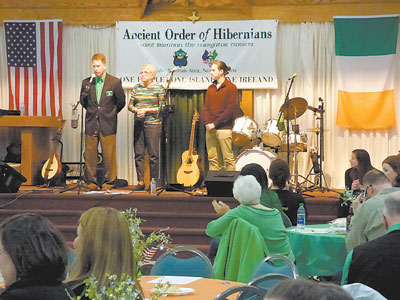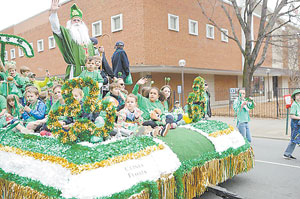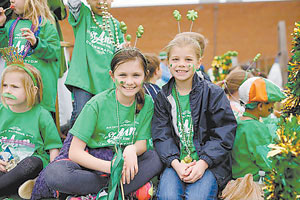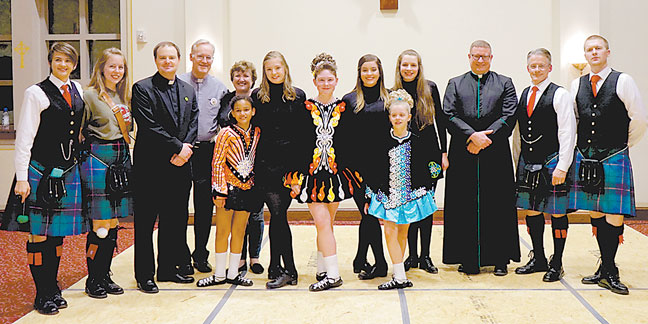 St. Patrick Cathedral celebrates patron saint
St. Patrick Cathedral celebrates patron saint
CHARLOTTE — Parishioners and clergy at St. Patrick Cathedral enjoyed Irish bagpipe music and traditional Irish dancing, courtesy of students from the Connick School of Traditional Irish Dance in Huntersville, during the parish’s patronal feast day celebration March 17.
— Photo provided byJane D. Pueschel
AOH hosts St. Patrick’s Day dinner at St. Mark Church
 HUNTERSVILLE — A sold-out crowd of more than 220 people attended the annual St. Patrick’s Celebration Dinner and Show at St. Mark Church March 10, hosted by the St. Brendan the Navigator Division of the Ancient Order of Hibernians of Huntersville. The event featured music by Banna, a popular Celtic band, dancers from the Connick School of Traditional Irish Dance in Huntersville, and a meal of corned beef, cabbage and potatoes by local caterer Waiters Choice.
HUNTERSVILLE — A sold-out crowd of more than 220 people attended the annual St. Patrick’s Celebration Dinner and Show at St. Mark Church March 10, hosted by the St. Brendan the Navigator Division of the Ancient Order of Hibernians of Huntersville. The event featured music by Banna, a popular Celtic band, dancers from the Connick School of Traditional Irish Dance in Huntersville, and a meal of corned beef, cabbage and potatoes by local caterer Waiters Choice.
The evening capped off with the singing of Irish ballads by St. Mark parishioner Heather Martin.
The event is organized each year by the AOH to support its charitable activities, including the Dick Seymour Education Award for Irish Catholic students entering college, named after the division’s recently deceased former president.
Applicants for the award must write an essay on a theme, which this year was “Dare to Dream: What does it take to be a Catholic in today’s world.” This year’s award was presented to Coleman Ziegler, a homeschool student from St. Mark Parish.
The AOH is a Catholic-Irish fraternal organization whose goals are to promote friendship, unity and Christian charity; foster and perpetuate Irish history, culture and traditions and to protect and defend all life. For details go to www.aohmeck2.org. PhotoS via Facebook
– Mike FitzGerald, Catholic News Herald
Celebrating St. Patrick’s Day
CHARLOTTE — St. Ann School took third place in the “Best Float” category during the annual St. Patrick’s Day parade in uptown Charlotte March 17.
— Photos via Facebook


HENDERSONVILLE — Immaculata School has received a great gift from a local couple that hopes to continue the blessing of Catholic education for generations to come. Gayden and Janell Gauthier, parishioners of Immaculate Conception Church since 2012, have created the Gauthier Family Endowment Fund with a stock gift of more than $100,000 to benefit the school.
The Gauthiers, originally from Louisiana, have been married 45 years and have two adult sons and two granddaughters. The couple shares that they were raised in the faith and are graduates of Catholic elementary education, so they want to help pass on the faith to future Catholic school students.
“Gayden and I both came from families where devotion to our faith was strongly demonstrated to us by both our grandparents as well as our parents,” Janell Gauthier said. “That struck me from a very young age. It is an important part of who I am and it gives me strength in times of distress.”
She expressed that her Catholic school education helped her go forward in her life with a good faith and moral foundation.
“As a result of the benefits we reaped, we would like to see that opportunity continue going forward in the future (at Immaculata School). We think that the school is a very important resource. We want to help the school go forward for current and future generations,” she said.
Gayden Gauthier hopes the endowment will foster faith in the younger generation, as he thinks some young people have lost interest in the faith.
“Our experience with millennials has been that some of them have not kept up going to church,” he said. “We would like to encourage youth to go to church. We want to foster that continuation of going to church in young people today. I see that the faith is dissipating (with some of them) – that they go to church when it’s convenient.”
“By creating the endowment,” Janell Gauthier added, “we think it is a way to say ‘thank you’ to God for all the blessings He has given us in our lives.”
In addition to the endowment gift, the Gauthiers each plan to leave $150,000 from their estates to Immaculate Conception Parish.
The Gauthier Family Endowment Fund will be administered through the Diocese of Charlotte Foundation. Established in 1994, the foundation has grown to encompass more than 255 endowments and more than $48 million in total assets.
An endowment is a permanent fund, the principal of which is never touched, but the income from which can be used according to the wishes of the donor organization or individual. Endowments provide a way to generate income and help sustain the long-term strength and viability of the recipient parish or ministry.
Immaculata School now has nine endowments which have been made through the foundation, totaling $1,440,894. To date, $587,690 has already been distributed through those endowments.
“We are so grateful for the Gauthiers’ generosity. While most people set up endowments to be distributed through their estate after their death, the Gauthiers are setting up an endowment now and also leaving additional gifts to the Church in their estates to benefit others,” said Jim Kelley, diocesan director of development.
“More and more people across the diocese are remembering the Church in their estate plans – gifts from thousands of dollars to millions – and we are thankful for their generosity,” Kelley said.
For details about endowments or estate gifts, contact Ray Correia, diocesan director of planned giving, at 704-370-3364 or This email address is being protected from spambots. You need JavaScript enabled to view it..
— SueAnn Howell, senior reporter


 St. Patrick Cathedral celebrates patron saint
St. Patrick Cathedral celebrates patron saint